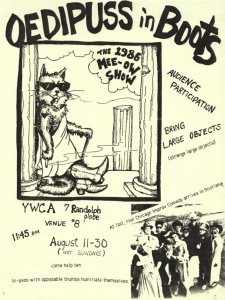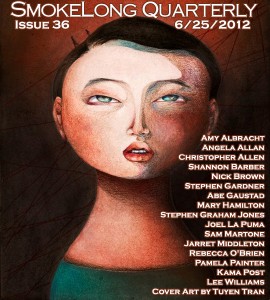Getting to know me eh? I could talk about all my food allergies and general cynicism, but really this is about my journey into improv. Well, I got into theater in general because I was following my sister’s footsteps in school by hooking up with the drama club. I did some performance in grade school but I’m kind of timid by nature and didn’t get really active until high school when I was influenced by my sister. My first exposure to improv came after rehearsal one night where the cast played freeze tag. I remember getting yelled at by one of the other actors for going up too often and ending the flow of things that were going well. I stuck with learning theater by getting a minor in it in college. But the real deal of improv started happening when I moved to Washington State. As a means to make friends, my sister suggested I join an improv troupe. I was a math teacher and assistant director of the plays at my high school. A student of mine at the time sent me to an audition but gave me the wrong time. I broke into a church where it was taking place to find already filled out used audition slips of all the people who had already been there. I was three hours late and the realization made my heart sink. But it turns out three hours late was the beginning of their rehearsal. As I was leaving they were showing back up and the result was Fools Play Improv took me on in 1996. After two years with them of weekly short form shows I went on a journey with another friend from Fools Play and started Improsia up in Seattle. We were motivated by trying to find ways to inject more traditional theatrical forms into improv. Improsia started as a company in December of 1998 with the goal of adding anything and everything into an improv show. Sing/Dance/Drama/Whatever. I learned a lot about what motivates me artistically in that time and where I wanted to see the art form go. I also formed the opinion that doing everything possible was a weird and basically unattainable goal. Wanting to experience more and get exposed to more, Improsia became the only representative of Seattle at the major festivals in America during the turn of the 20th century. Through my travels I studied as much improv as I could with all sorts of greats of the art form from around the country. And as I got better I ended up performing my brand of improv in LA, DC, Portland, Edinburgh, Chicago, Austin. The success of Improsia connected me to being the artistic director of the now shuttered Seattle Neutrino Project and more recently the creation of the Improsia offshoot, The Temporary People.
Feeling like I have more comedy within me, I have begun writing and performing original essays about life and how I view the world. The further exposure to more types of performance continues to evolve my thinking about improv. I also draw inspiration from all sorts of places. I can say films like Magnolia, stage shows like Young Frankenstein the musical, performance troupes like Blue Man Group, and beatboxers like Roxorloops all have caused me to rethink, change, and add elements to the shows that I develop.
Today I have very strong opinions about the subject. I am greatly guided by a desire to something that connects with an audience and am constantly asking myself the question, why do improv over something else. What qualities separate it as an art form, why are those worthy, and how can I utilize that strength to its maximum? I don’t aim for goals like “do an improv show that is as worthy as a play” or “is as good as scripted work”. I want to do improv because it brings to the table something that only it brings and I want to blow people’s mind with that. Otherwise I should do something else.


